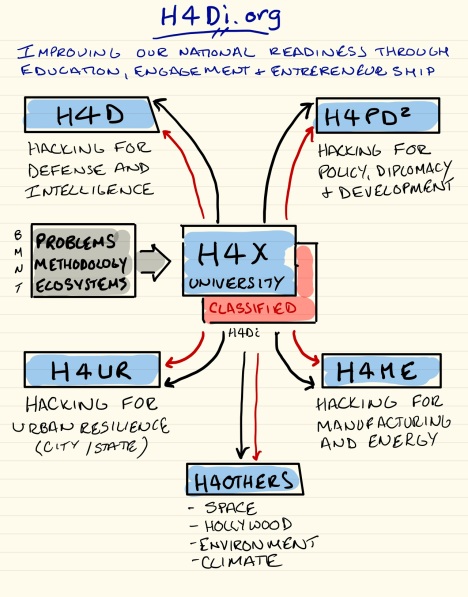We’re holding our 2nd Hacking for Defense, Diplomacy,… educators and sponsors class January 17-19 at Georgetown University. The class is for:
- educators who want to learn how to teach a Hacking for Defense, Diplomacy, Development, etc. class;
- problem sponsors who want to learn how to get the most out of their interaction with student teams and how to use the teams to help accelerate their problem
- government organizations who want to a more efficient way to deliver needed solutions with speed and urgency to their stakeholders.
- corporate innovation leaders and technologists who want to engage with both emerging national problems and students who are the future corporate work force
The Innovation Insurgency
We taught the first Hacking for Defense class less than 6 months ago
 Our first Hacking for Diplomacy class ended this month.
Our first Hacking for Diplomacy class ended this month.
Our goal was to scale these classes across the US giving students the opportunity to perform national service by getting solving real defense/diplomacy problems using Lean Methods. In exchange our government sponsors benefit from access to talent that most likely would never have served the country.
We trained our first group of educators and sponsors three months ago. Since then 8 universities have taught the Hacking for Defense class or put it on their academic calendar for 2017: UC San Diego, Georgetown, Air Force, University of Pittsburgh, James Madison University, Boise State, RIT, and Stanford.
Since then our Hacking for Defense our original sponsors; (JIDO, ARCYBER, AWG, USMC, NSA, AFNWC, SOCOM, 75th Ranger Regiment, USTRANSCOM, Cyber Force Protection Brigade, National Defense University, and the Center for Technology and National Security Policy) and a host of new ones have given us another 45 national security problems for these universities to solve.
Our Hacking for Diplomacy sponsors at State gave us 15 problems for the students to solve. The students selected seven from the the Office of Space and Advanced Technology, the Bureau of Political-Military Affairs, the Bureau of Conflict and Stabilization Operations the Bureau of Counterterrorism and Countering Violent Extremism, the Bureau of Population, Refugees, and Migration and the Office to Monitor and Combat Trafficking in Persons.
What We’ve Learned: Hacking for X
As soon as we stood up the first Hacking for Defense class we began to get requests from universities that sounded like, “can we start a Hacking for Energy class?” or “How about a NASA or the NRO class with Hacking for Space as the topic?” As soon as we followed it up with Hacking for Diplomacy we got asked, “Will this work at USAID with Hacking for Development?” How about a completely classified version? Or my favorite, “How about we get the movie studios give us some of their toughest challenges and we offer a “Hacking for Hollywood class in a Los Angeles university?”
More encouraging was that program managers inside of existing government agencies started asking, “could we use this method to better understand our stakeholder/warfighter needs to build and deliver needed solutions with speed and urgency?”
Most encouraging was the reaction of our students, who as Dean Al Pisano at the University of San Diego Jacobs School of Engineering put it “Will never look at their education curriculum the same way again.” Many of these same students whom have never been given an opportunity to provide a public service to their country are now consider solving our nation’s problems the coolest job they could have.
The answers to all of these questions are yes, yes, yes and yes.
Why this is possible is that at its core the Hacking for X for pedagogy is built around the same Lean methodology that’s been proven on the battlefield of Iraq and Afghanistan, Silicon Valley and the 1000+ teams from the National Science Foundation. Modifying the curriculum for a specific technology or field of interest; whether it’s defense, diplomacy or development or something that has yet to be asked for, is relatively simple.
 Hacking for X Educators Class
Hacking for X Educators Class
We done five things to make this possible.
First, we (Pete Newell, Joe Felter, Tom Byers and I) set up a non-profit – H4Di.org to coordinate all these educational opportunities.
- We wrote a 300-page educator guide which illustrates how to set up and teach a canonical “Hacking for…” class.
- We wrote a sponsor guide which shows best practices for sponsors who want to offer problems for university students
- We wrote a program managers guide to help leaders inside government organizations use the class to speed up their problem solving process
- We hold a 2 ½ day educator class twice a year (east coast and west) to train both educators and sponsors on best practices and logistics
Come join us at the January 17-19th Hacking for Defense, Diplomacy, Development class at Georgetown and learn how this works.